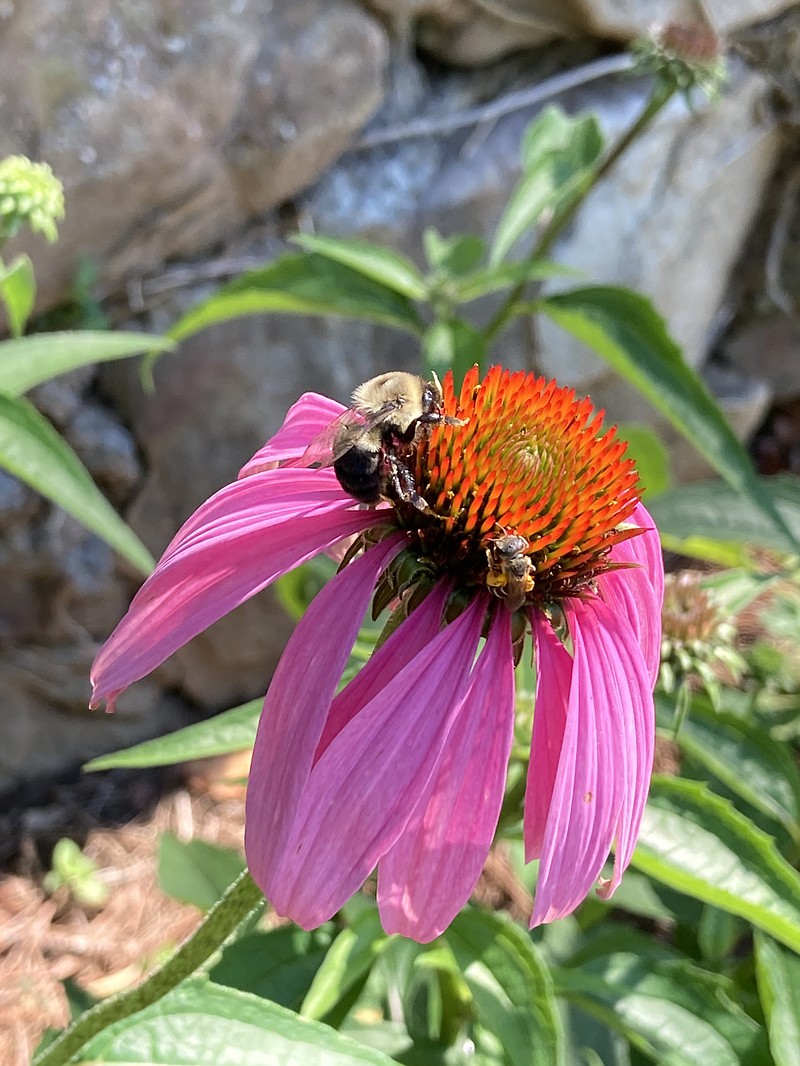Earlier this summer, my wife and I spent a lovely morning with Ann Brown, a retired librarian who lives on Lookout Mountain with husband Howard. As we drove around the mountain looking at purple coneflowers, black-eyed Susans and swamp milkweed, Ann, so kind and inviting, gave us something most valuable.
A new perspective.
Inspired by bees, butterflies and the God who created them, Brown is on a mission:
"Change the way we see our yards," she declared.
Brown is not alone. With her: all of Creation. Garden clubs across the nation. Many of you in this city. Naturalists, scientists and ecologists who say the restoration of the world begins at home.
With our yards.
"Landscape is so disrupted by urbanization and suburbanization," she said "We've lost our connection to what is native in our area."
Our yards carry great potential. We can cultivate a mono-grass, cut low, with chemicals, where nothing else grows, inspired by an unnatural standard of lawn beauty.
Or, we can build vibrant, healthy lawns, alive with native plants, which attract all-important creatures - bees, butterflies, caterpillars, birds - while restoring our own hearts.
"If you plant a pollinator garden, you're inviting all these insects, birds and butterflies to your yard," Brown said. "Putting chemicals in it is like inviting your friends over for dinner and poisoning them."
Over the past several years, garden clubs on Lookout, designated an official Bee City USA, have created a trail of native plants, pollinator gardens at public parks, private homes and schools across the mountain. Containing thousands of perennials, the gardens are exquisite, beautiful, a four-season refuge of nectar, fruit and food for countless butterflies, bees, moths and insects.
Brown, who will gladly give her presentation at your church, school, garden club or neighborhood association, says it all goes back to education. (Contact her at princeoberon@gmail.com.)
Consider ants. Or, rather, reconsider them.
"People hate ants," she said. "Yet we would be dead if it weren't for ants."
Oak trees?
"The most important foundation trees for insects," she said.
Lawnmowers?
"I mow every two or three weeks," she said. "If you have a lawn, you want it full of clover."
In our yard, I used to hate plantain. I'd pull it, spray it, yank it, low-mow it.
I didn't take time to understand it. Appreciate it.
Plantain is a beautiful native plant. Medicinal and edible, it is also good food for insects, birds and bees.
"When you weed out plantain, you are eliminating the hitched arches moth from your yard, as well as buckeye butterflies, various tiger moths, and the giant leopard moth," writes Doug Tallamy in "Nature's Best Hope."
Hating plantain, I was projecting my stresses and insecurities onto my yard, holding it to an impossible standard of keeping up with the Southern-Living-Joneses.
Now, my view has changed. Plantain? Dandelion? Clover? Buckwheat? The more, the better. As I sorted out my own stress, I began to relax in my yard more, approaching it less as king and conqueror, more as friend and servant.
Nature responded.
This year, we have more hummingbirds in our yard than ever. Asters, which I used to mow over, now blanket parts of our yard, a gentle native fall-blooming flower.
Is it perfect? Hah.
But there are some bees who like it an awful lot.
"In the past, we have asked one thing of our gardens: that they be pretty. Now they have to support life, sequester carbon, feed pollinators and manage water," Tallamy declares.
Tallamy's new book - "Nature's Best Hope" - is a must-read. His vision: convert 20 million acres of American lawns into "native plant communities."
"We can create this country's largest park system," he declares. "Because so much of this park will be created at our homes, I suggest we call it Homegrown National Park."
Now is the perfect time.
This Saturday, Oct. 2, Tennessee Valley Wild Ones hosts a fall plant sale at Grace Episcopal Church (Belvoir Avenue) from 10 a.m. to 2 p.m.
Wild Ones members are generous, their website - tnvalleywildones.org - extensive. We are so fortunate to have a chapter here. So, too, Reflection Riding, which has a native plant nursery open five days a week. (Reflectionriding.org).
You can start small.
Just start.
"Every little plant you put in has an impact," Brown said.
Imagine if every plant, shrub or tree planted by the city or county or landscaping crews was native.
Imagine if Hamilton County converted 5,000 acres of yard into native plant landscapes.
"One yard at a time," Brown said.
David Cook writes a Sunday column and can be reached at dcook@timesfreepress.com.
